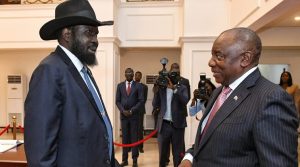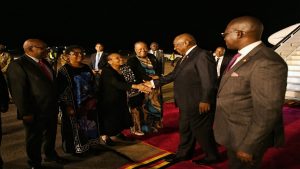South Africa’s Deputy President Cyril Ramaphosa paid homage to poet and political activist William Keorapetse Kgositsile on Tuesday, describing him as committed, brave and never deterred by the brutal apartheid regime.
After the Sharpeville massacre in 1960, activists streamed out of the country to wage a fierce fight against apartheid from abroad.
In 1961, the year in which the African National Congress (ANC) established its military wing uMkhonto We Sizwe (MK), he was one of the young cadres sent into exile.
“The ANC leadership recognised his potential to be the envoy that would amplify the voice of the liberation movement throughout the world,” Ramaphosa said as he delivered a eulogy at the official funeral of the revered poet laureate in Johannesburg on Tuesday.
“He associated himself with people’s resistance struggle at an early age, dating back to the 1950s when he became a member of the ANC.
He was not discouraged and forever remained committed and brave.”
Kgositsile was one of the trusted ANC cadres, and one of the foremost intellectuals, Ramaphosa added.
Kgositsile died after a short illness on January 3, aged 79. He left South Africa aged 23 and returned after the unbanning of political parties when he was in his 50s. Kgositsile was popularly known by his pen name Bra Willie.
He was inaugurated in 2006 as South Africa’s second national poet laureate after the first national poet laureate Mazisi Kunene.
He was also a recipient of the National Order of Ikhamanga for his contribution to literature.
Kgositsile was an internationalist of note who touched the lives of many through his poetry and political activism, and his death has reverberated across the globe.
In his three decades of exile, Kgositsile fought injustices through his poetry, teachings and publications.
He lived in several countries, including the United States, Botswana, Tanzania and Kenya.
Upon his return to South Africa following the jettisoning of the apartheid regime in 1994, Kgositsile worked with several academic and government institutions.
In his lifetime, he mentored countless cultural practitioners, academics and political activists.
Click video below:






